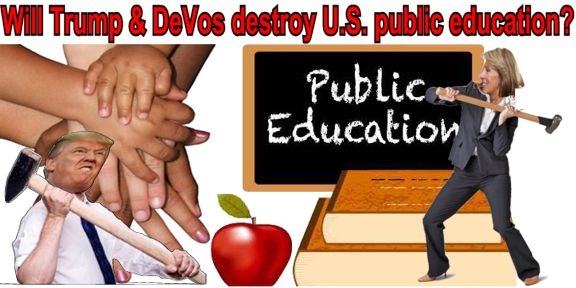Will Trump Overhaul Public Education?
From privatization to civil rights, his Department of Education could transform the American system.

ast week, President-elect Donald Trump announced a strongly ideological pick for secretary of education: Michigan philanthropist Betsy DeVos. Unlike the current secretary, John King, or the previous one, Arne Duncan, DeVos has never led a state education department or school district. As an advocate and donor, she has been committed to the concept of school choice, not necessarily as a driver of improved student achievement—she has supported for-profit and virtual charter schools, as well as private school vouchers, all of which have disappointing academic track records—but to choice as a good in and of itself. DeVos is also a social conservative. She and her husband, Amway heir Dick DeVos, have funded anti–gay marriage and anti–affirmative action efforts. If she is confirmed, which is likely, she will inherit a department that spends $68 billion per year.
As I wrote last week, DeVos will certainly try to direct federal education dollars toward vouchers that parents could use at any school, private or public. However, the work of the Department of Education is much broader than that, encompassing a number of areas, from school discipline to campus sexual assault to pre-K, where DeVos has essentially no record. Trump will have the opportunity to appoint at least seven other high-level officials to the Department of Education, who in turn will hire dozens of political appointees. What could happen to President Obama’s legacy on education, which emphasized civil rights and school accountability? What can the Trump administration do on its own, and what would require action from Congress? The most radical outcome would be a federal government that vastly increases profit-making opportunities in public education while declining to investigate discrimination in schools. But what is actually likely to happen?
To game out the possibilities, I spoke to two experts with deep knowledge of how federal education policy is crafted. Mike Petrilli is president of the Thomas B. Fordham Institute, a center-right education think tank, and from 2001 to 2005 he worked for the Department of Education under President George W. Bush. Andrew Rotherham is the founder of Bellwether Education Partners, a nonprofit consulting firm, and worked for President Bill Clinton from 1999 to 2000 as a special assistant for domestic policy. They both said that many of Obama’s education priorities could be easily reversed, since they were accomplished through executive regulation and letters of guidance, not legislation. And even if Trump and DeVos don’t take decisiveHow Much Damage Could Trump Do to Public Education?:
